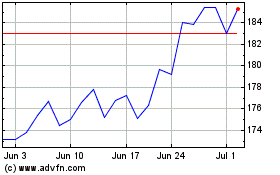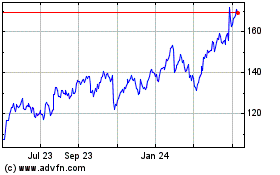Google Inc.'s (GOOG) carefully structured stock split keeps
insider control of the company at the same level but dilutes other
shareholders' influence and raises the prospect of current owners
having lifelong control of the company, experts said Friday.
Thursday, the Mountain View, Calif., company said it would
create a new class of stock, which would be listed on the Nasdaq
Stock Market and be distributed to shareholders via a tax-free
dividend. Each holder will get a new Class C share for each Class A
and Class B share, producing an effective two-for-one split.
The twist is that the new shares will be a nonvoting class of
stock. The distribution preserves the level of control for Chief
Executive Larry Page, co-founder Sergey Brin and Executive Chairman
Eric Schmidt, who collectively hold about 66% of the company's
voting power.
As a result of the split, shareholders will have twice as many
shares but no additional influence, an issue that can intensify as
more Class C shares get added over time, said MKM Partners
event-driven strategist Keith Moore.
"Shareholders are generally aggravated their voting power will
be diluted," he said.
Google's Class A shares closed down 4.1% at $624.60 Friday.
"From a shareholder perspective, this should be very troubling,"
said Charles M. Elson, head of the Weinberg Center for Corporate
Governance at University of Delaware's business school. If
something is going wrong at the company, he said, shareholders have
very little they can do to influence the company's direction.
"That lack of accountability ultimately leads to poor management
decision-making," Elson said.
The structure will make it harder for shareholders to challenge
Page, Brin and Schmidt, as activists have done at other tech
companies. For example, the founders of Yahoo Inc. (YHOO) and
Research In Motion Ltd. (RIMM, RIM.T) recently diminished their
respective roles in part because of shareholder complaints.
Barry Genkin, a partner at law firm Blank Rome LLP in
Philadelphia with expertise in corporate governance, said if Class
C shareholders are dissatisfied, their chief recourse simply is to
"vote with their feet and that's to sell the stock."
Google's Page said on the company's conference call Thursday
"investors and others have always taken a big bet" on himself and
Brin. "That bet will likely last longer as a result of these
changes."
Page and Brin also said in a letter they "decided that
maintaining this founder-led approach is in the best interests of
Google." A Google representative reiterated the founders' comments
in an email Friday.
The split will provide the company more flexibility in rewarding
employees and in making acquisitions, the founders said, though
Google was quick to tamp down speculation a big deal was in the
offing.
Evercore Partners analyst Ken Sena said in terms of voting
interest and economics, the split wouldn't have much of an impact
initially. But he noted the new structure raised the prospect of
giving Page, Brin and Schmidt lifetime control over Google.
Under the pre-split structure, a point may have arrived in a
10-year time span in which the owners' voting power fell below 50%,
he said, just through acquisitions and stock-option issuance to
employees.
"Now you have a currency that could be used instead where
there's no voting dilution of the three," Sena said.
Google's Class C shares likely will trade at a discount to the
Class A shares currently on the market, although the difference is
expected to be minimal. "The plan should not change a holder's
fundamental evaluation of the merits of holding [Google] shares,"
MKM's Moore said.
The price of the Class A shares is expected to be cut in half
after the split.
Other companies have dual-class stock structures. News Corp.
(NWS, NWSA, NWS.AU), which owns Dow Jones & Co., publisher of
this newswire, and The Wall Street Journal, has Class A shares with
limited voting rights as well as more powerful Class B shares. As
of Friday's close, the more narrowly held Class B shares were
priced 1.9% higher.
Investor wariness about the new stock structure contributed to
the decline Friday in Google's share price. In addition, investors
were re-evaluating the quality of Google's first-quarter earnings
increase, which was helped by a lower tax rate and slower
hiring.
Sameet Sinha, analyst at B. Riley & Co., said the shares'
move lower came as Wall Street analysts were largely raising price
targets and estimates based on Google's improving fundamentals.
"The nonfundamental issue is the stock split, and that's what
investors are working through," he said, adding some are finding
the new structure is "probably not that good a thing."
-By Joan E. Solsman, Dow Jones Newswires; 212-416-2291;
joan.solsman@dowjones.com
Alphabet (NASDAQ:GOOGL)
Historical Stock Chart
From Mar 2024 to Apr 2024

Alphabet (NASDAQ:GOOGL)
Historical Stock Chart
From Apr 2023 to Apr 2024
